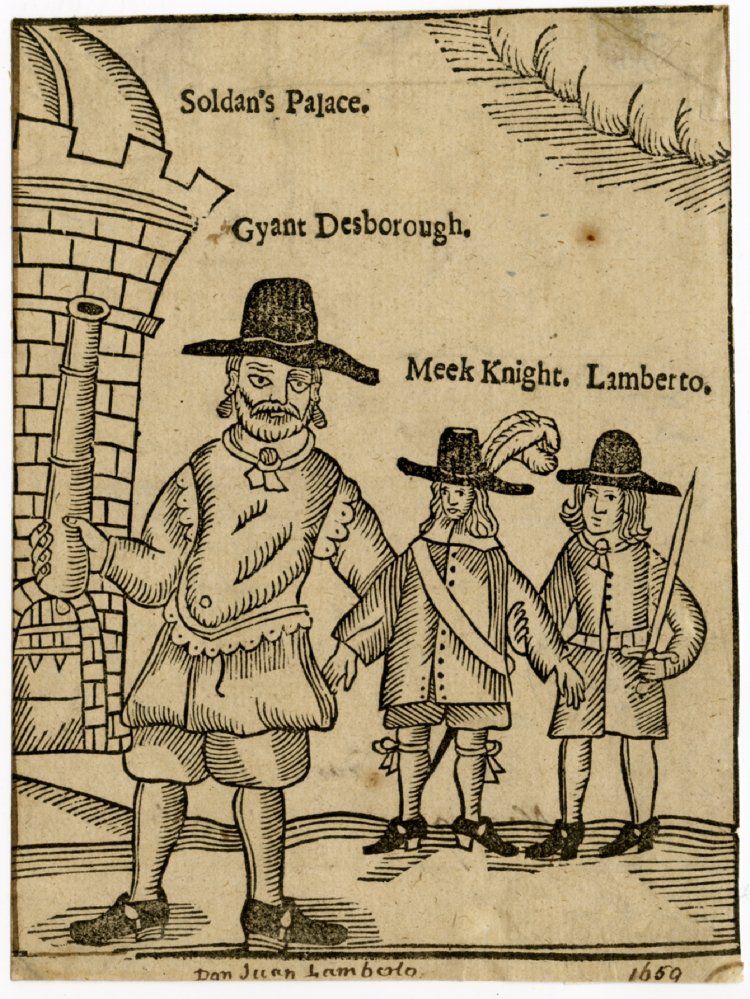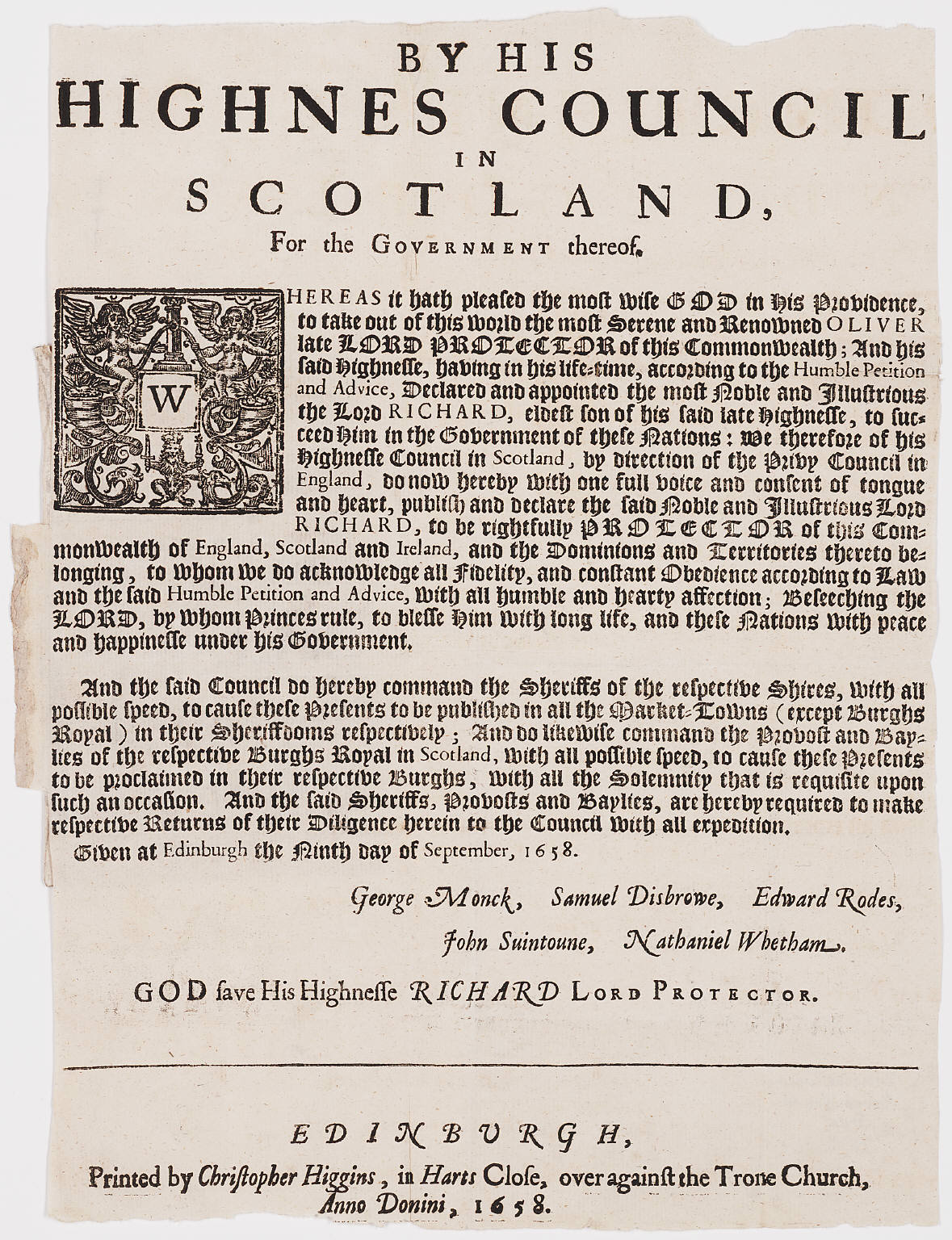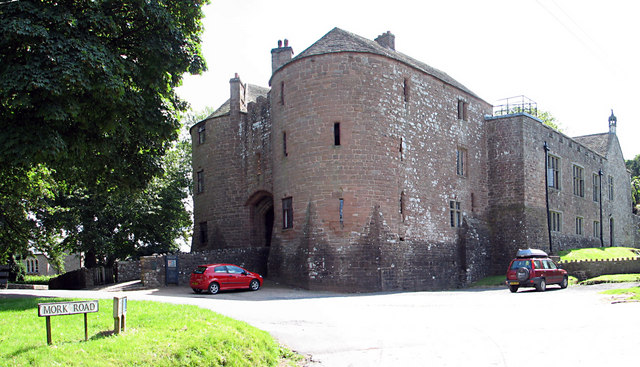|
John Desborough
John DesboroughAlso spelt John Disbrowe and John Desborow (the latter in the Indemnity and Oblivion Act, section XLIII) (1608–1680) was an English soldier and politician who supported the parliamentary cause during the English Civil War. Life He was the son of James Desborough of Eltisley, Cambridgeshire, and of Elizabeth Hatley of Over in the same county. He was baptized on 13 November 1608. He was educated in law. On 23 June 1636 he married at Eltisley Jane, daughter of Robert Cromwell of Huntingdon, and sister of Oliver Cromwell, the future Lord Protector. He took an active part in the English Civil War, and showed considerable military ability. In 1645, he was present as major in the engagement at Langport on 10 July, at Hambleton Hill on 4 August, and on 10 September he commanded the horse at the storming of Bristol. Later he took part in the operations round Oxford. In 1648, as colonel he commanded the forces at Great Yarmouth. He avoided all participation in the t ... [...More Info...] [...Related Items...] OR: [Wikipedia] [Google] [Baidu] |
English Civil War
The English Civil War (1642–1651) was a series of civil wars and political machinations between Parliamentarians (" Roundheads") and Royalists led by Charles I ("Cavaliers"), mainly over the manner of England's governance and issues of religious freedom. It was part of the wider Wars of the Three Kingdoms. The first (1642–1646) and second (1648–1649) wars pitted the supporters of King Charles I against the supporters of the Long Parliament, while the third (1649–1651) saw fighting between supporters of King Charles II and supporters of the Rump Parliament. The wars also involved the Scottish Covenanters and Irish Confederates. The war ended with Parliamentarian victory at the Battle of Worcester on 3 September 1651. Unlike other civil wars in England, which were mainly fought over who should rule, these conflicts were also concerned with how the three Kingdoms of England, Scotland and Ireland should be governed. The outcome was threefold: the trial of and ... [...More Info...] [...Related Items...] OR: [Wikipedia] [Google] [Baidu] |
Salisbury
Salisbury ( ) is a cathedral city in Wiltshire, England with a population of 41,820, at the confluence of the rivers Avon, Nadder and Bourne. The city is approximately from Southampton and from Bath. Salisbury is in the southeast of Wiltshire, near the edge of Salisbury Plain. Salisbury Cathedral was formerly north of the city at Old Sarum. The cathedral was relocated and a settlement grew up around it, which received a city charter in 1227 as . This continued to be its official name until 2009, when Salisbury City Council was established. Salisbury railway station is an interchange between the West of England Main Line and the Wessex Main Line. Stonehenge is a UNESCO World Heritage Site and is northwest of Salisbury. Name The name ''Salisbury'', which is first recorded around the year 900 as ''Searoburg'' ( dative ''Searobyrig''), is a partial translation of the Roman Celtic name ''Sorbiodūnum''. The Brittonic suffix ''-dūnon'', meaning "fortress" (in reference ... [...More Info...] [...Related Items...] OR: [Wikipedia] [Google] [Baidu] |
Richard Cromwell
Richard Cromwell (4 October 162612 July 1712) was an English statesman who was the second and last Lord Protector of the Commonwealth of England, Scotland and Ireland and son of the first Lord Protector, Oliver Cromwell. On his father's death in 1658 Richard became Lord Protector, but lacked authority. He tried to mediate between the army and civil society and allowed a Parliament containing many disaffected Presbyterians and Cavalier, Royalists to sit. Suspicions that civilian councillors were intent on supplanting the army were brought to a head by an attempt to prosecute a major-general for actions against a Royalist. The army made a threatening show of force against Richard and may have had him in detention. He formally renounced power nine months after succeeding. Although a Royalist revolt was crushed by the recalled civil war figure General John Lambert (general), John Lambert, who then prevented the Rump Parliament from reconvening and created a Committee of Safety, Lam ... [...More Info...] [...Related Items...] OR: [Wikipedia] [Google] [Baidu] |
Cromwell's Upper House
The Other House (also referred to as the Upper House, House of Peers and House of Lords), established by the Lord Protector Oliver Cromwell under the terms of the Humble Petition and Advice, was one of the two chambers of the parliaments that legislated for England and Wales, Scotland, and Ireland, in 1658 and 1659, the final years of the Protectorate.The Humble Partition states "to create the 'Other House,' the members to be such as should be nominated by his highness and approved by the commons". George Craik notes "The commonwealth-men, it appears, would tolerate neither the designation 'House of Lords.' nor that of 'Upper House.' The thing was, therefore, termed 'the Other House;' that branch of the legislature losing not less in real power than it lost in name or dignity: they were not to exceed seventy in number, nor to be less than forty, whereof one-and-twenty were to form a quorum; they were not to give any vote by proxy; on death or removal no new members were to be admitt ... [...More Info...] [...Related Items...] OR: [Wikipedia] [Google] [Baidu] |
Protector's Privy Council
The English Council of State, later also known as the Protector's Privy Council, was first appointed by the Rump Parliament on 14 February 1649 after the execution of King Charles I. Charles' execution on 30 January was delayed for several hours so that the House of Commons could pass an emergency bill to declare the representatives of the people, the House of Commons, as the source of all just power and to make it an offence to proclaim a new King. This in effect abolished the monarchy and the House of Lords. History The Council of State was appointed by Parliament on 14 and 15 February 1649, with further annual elections. The Council's duties were to act as the executive of the country's government in place of the King and the Privy Council. It was to direct domestic and foreign policy and to ensure the security of the English Commonwealth. Due to the disagreements between the New Model Army and the weakened Parliament, it was dominated by the Army. The Council held its ... [...More Info...] [...Related Items...] OR: [Wikipedia] [Google] [Baidu] |
Somerset
( en, All The People of Somerset) , locator_map = , coordinates = , region = South West England , established_date = Ancient , established_by = , preceded_by = , origin = , lord_lieutenant_office =Lord Lieutenant of Somerset , lord_lieutenant_name = Mohammed Saddiq , high_sheriff_office =High Sheriff of Somerset , high_sheriff_name = Mrs Mary-Clare Rodwell (2020–21) , area_total_km2 = 4171 , area_total_rank = 7th , ethnicity = 98.5% White , county_council = , unitary_council = , government = , joint_committees = , admin_hq = Taunton , area_council_km2 = 3451 , area_council_rank = 10th , iso_code = GB-SOM , ons_code = 40 , gss_code = , nuts_code = UKK23 , districts_map = , districts_list = County council area: , MPs = * Rebecca Pow (C) * Wera Hobhouse ( LD) * Liam Fox (C) * David Warburton (C) * Marcus Fysh (C) * Ian Liddell-Grainger (C) * James Heappey (C) * Jacob Rees-Mogg (C) * John Penrose (C) , police = Avon and Somerset Police ... [...More Info...] [...Related Items...] OR: [Wikipedia] [Google] [Baidu] |
Second Protectorate Parliament
The Second Protectorate Parliament in England sat for two sessions from 17 September 1656 until 4 February 1658, with Thomas Widdrington as the Speaker of the House of Commons. In its first session, the House of Commons was its only chamber; in the second session an Other House with a power of veto over the decisions of the Commons was added. Background There were two sessions the first from 17 September 1656 until 26 June 1657 and a second from 20 January until 4 February 1658. The Second Protectorate Parliament was summoned reluctantly by the Lord Protector Oliver Cromwell on the advice of the Major-Generals who were running the country as regions under military governors. The Major-Generals thought that a compliant parliament would be the best way to raise money to pay for the Army occupation, and the Navy both of which were involved in the Anglo-Spanish War (1654–1660). The elections were held under the new written constitution called Instrument of Government. It in ... [...More Info...] [...Related Items...] OR: [Wikipedia] [Google] [Baidu] |
First Protectorate Parliament
The First Protectorate Parliament was summoned by the Lord Protector Oliver Cromwell under the terms of the Instrument of Government. It sat for one term from 3 September 1654 until 22 January 1655 with William Lenthall as the Speaker of the House. During the first nine months of the Protectorate, Cromwell with the aid of the Council of State, drew up a list of 84 bills to present to Parliament for ratification. But the members of Parliament had their own and their constituents' interests to promote and in the end not enough of them would agree to work with Cromwell, or to sign a declaration of their acceptance of the ''Instrument of Government'', to make the constitutional arrangements in the ''Instrument of Government'' work. Cromwell dissolved the Parliament as soon as it was allowed under the terms of the ''Instrument of Government'', having failed to get any of the 84 bills passed. Parliamentary constituencies The ''Instrument of Government'' specified the numbers of memb ... [...More Info...] [...Related Items...] OR: [Wikipedia] [Google] [Baidu] |
Barebones Parliament
Barebone's Parliament, also known as the Little Parliament, the Nominated Assembly and the Parliament of Saints, came into being on 4 July 1653, and was the last attempt of the English Commonwealth to find a stable political form before the installation of Oliver Cromwell as Lord Protector. It was an assembly entirely nominated by Oliver Cromwell and the Army's Council of Officers. It acquired its name from the nominee for the City of London, Praise-God Barebone. The Speaker of the House was Francis Rous. The total number of nominees was 140, 129 from England, five from Scotland and six from Ireland (see the list of MPs). After conflict and infighting, on 12 December 1653, the members of the assembly voted to dissolve it. It was preceded by the Rump Parliament and succeeded by the First Protectorate Parliament. Need for a parliament Following the execution of King Charles, the Rump Parliament was the last remaining element of the English government. It had little or no clai ... [...More Info...] [...Related Items...] OR: [Wikipedia] [Google] [Baidu] |
Rule Of The Major-Generals
The Rule of the Major-Generals, was a period of direct military government from August 1655 to January 1657, during Oliver Cromwell's Protectorate. England and Wales were divided into ten regions, each governed by a major-general who answered to the Lord Protector. The period quickly "became a convenient and powerful symbol of the military nature of the unpopular Interregnum state". Policies The Rule of the Major-Generals was set up by Cromwell by his orders to the army, and was not supported by parliamentary legislation. His goal was threefold: to identify, tax, disarm and weaken the Royalists, whom he saw as conspirators against his rule. The system was also an economical measure because the military budget had been cut. The major generals would take control of incumbent civilian administrations, which would not require an expansion of local military forces. As well, he sought "a reformation of manners" or moral regeneration through the suppression of vice and the encouragement ... [...More Info...] [...Related Items...] OR: [Wikipedia] [Google] [Baidu] |
Gloucestershire
Gloucestershire ( abbreviated Glos) is a county in South West England. The county comprises part of the Cotswold Hills, part of the flat fertile valley of the River Severn and the entire Forest of Dean. The county town is the city of Gloucester and other principal towns and villages include Cheltenham, Cirencester, Kingswood, Bradley Stoke, Stroud, Thornbury, Yate, Tewkesbury, Bishop's Cleeve, Churchdown, Brockworth, Winchcombe, Dursley, Cam, Berkeley, Wotton-under-Edge, Tetbury, Moreton-in-Marsh, Fairford, Lechlade, Northleach, Stow-on-the-Wold, Chipping Campden, Bourton-on-the-Water, Stonehouse, Nailsworth, Minchinhampton, Painswick, Winterbourne, Frampton Cotterell, Coleford, Cinderford, Lydney and Rodborough and Cainscross that are within Stroud's urban area. Gloucestershire borders Herefordshire to the north-west, Worcestershire to the north, Warwickshire to the north-east, Oxfordshire to the east, Wiltshire to the south, Bristol and Somerset ... [...More Info...] [...Related Items...] OR: [Wikipedia] [Google] [Baidu] |
St Briavel's Castle
St Briavels Castle is a moated Norman castle at St Briavels in the English county of Gloucestershire. The castle is noted for its huge Edwardian gatehouse that guards the entrance. St Briavels Castle was originally built between 1075 and 1129 as a royal administrative centre for the Forest of Dean. During the 13th century the castle became first a favourite hunting lodge of King John, and then the primary centre in England for the manufacture of quarrels, large numbers of which were required for crossbows in medieval warfare. The castle was transferred many times between royal favourites in the 14th and 15th centuries and slowly declined in appearance and importance. St Briavels Castle became used primarily as a court and as a notorious debtors' prison, conditions being documented by the prison reformer John Howard in 1775. Following local riots and a parliamentary investigation in the 1830s, reforms in the 19th century brought an end to the castle's use as a prison. Extensive ... [...More Info...] [...Related Items...] OR: [Wikipedia] [Google] [Baidu] |






